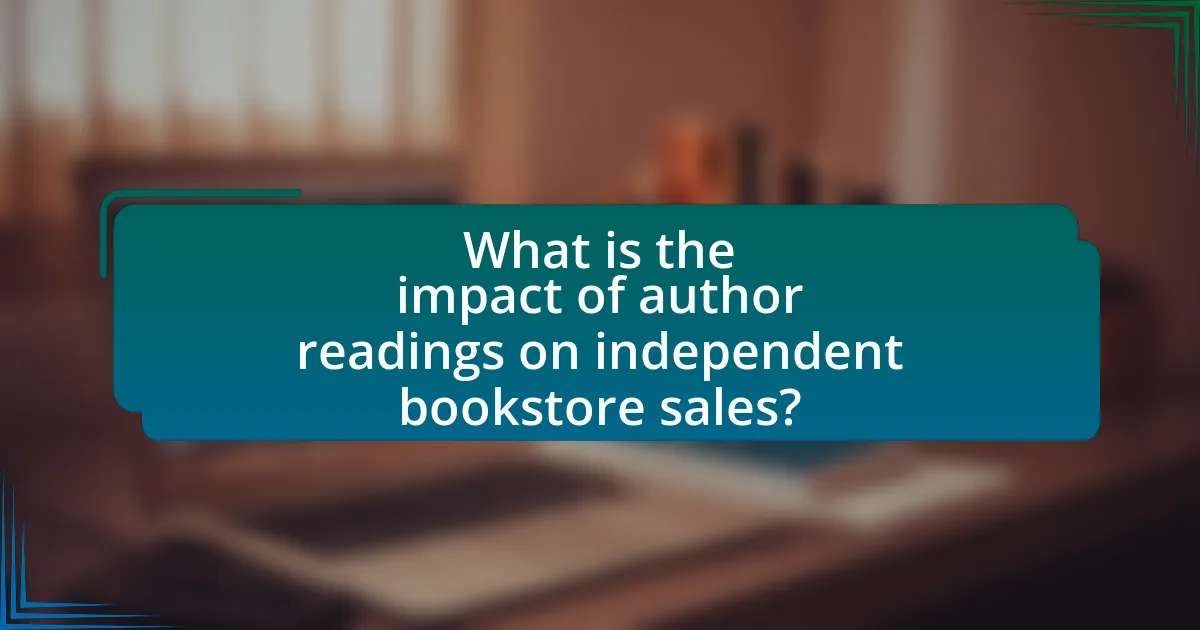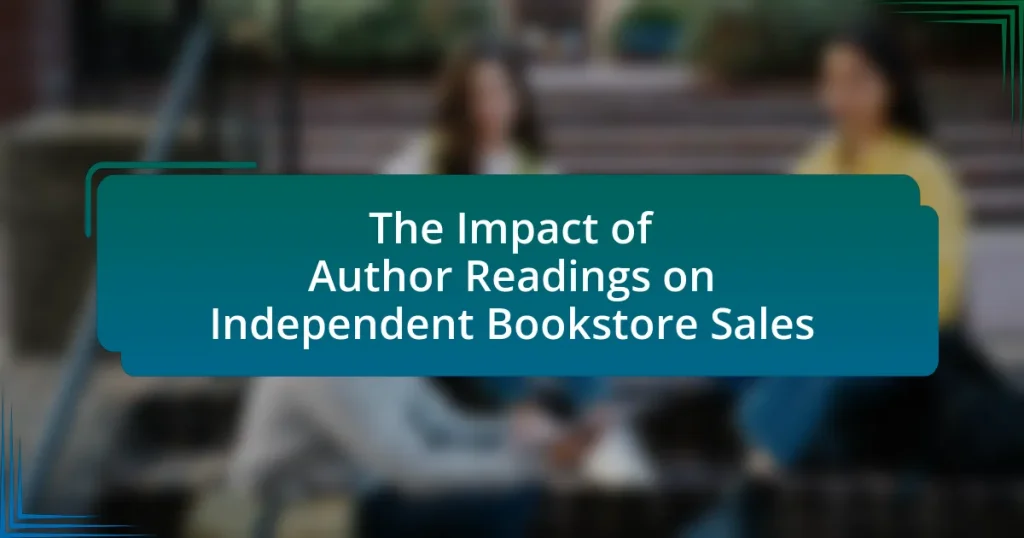The article examines the significant impact of author readings on independent bookstore sales, highlighting how these events attract customers and foster community engagement. It presents findings from the American Booksellers Association, indicating that bookstores hosting author events can experience a 20-30% increase in sales on event days. The article also discusses the effectiveness of interactive readings, the role of author presence in enhancing event atmosphere, and the logistical considerations bookstores must address to maximize attendance and sales. Additionally, it explores strategies for effective marketing and community partnerships that can further enhance the success of author readings.

What is the impact of author readings on independent bookstore sales?
Author readings significantly boost independent bookstore sales by attracting customers and creating a community atmosphere. These events often lead to increased foot traffic, as fans of the authors attend, which can result in immediate sales of the featured books. For instance, a study by the American Booksellers Association found that bookstores hosting author events reported a 20-30% increase in sales on the day of the event compared to regular sales. Additionally, author readings enhance customer engagement and loyalty, as attendees often return for future events, further contributing to sustained sales growth.
How do author readings influence customer engagement in bookstores?
Author readings significantly enhance customer engagement in bookstores by creating a direct connection between authors and their audience. This interaction fosters a sense of community and belonging among attendees, which can lead to increased foot traffic and sales. Research indicates that events featuring authors can boost sales by up to 30% during the event and in the following weeks, as customers are more likely to purchase books after experiencing a personal connection with the author. Additionally, author readings often generate social media buzz, further amplifying customer interest and engagement with the bookstore.
What types of author readings are most effective in attracting customers?
Interactive author readings are most effective in attracting customers. These readings engage the audience through Q&A sessions, live demonstrations, or interactive storytelling, which fosters a connection between the author and attendees. Research indicates that events with interactive elements can increase attendance by up to 30%, as they create a more memorable experience for participants. Additionally, themed readings that align with current trends or popular genres tend to draw larger crowds, as they resonate with the interests of potential customers.
How does the presence of an author affect the atmosphere of a bookstore event?
The presence of an author significantly enhances the atmosphere of a bookstore event by creating a sense of excitement and engagement among attendees. When an author is present, it fosters a personal connection between the audience and the writer, which can lead to increased interest in the author’s work. This dynamic often results in higher attendance rates, as fans are motivated to meet the author, ask questions, and participate in discussions. Research indicates that events featuring authors can boost sales by up to 50% compared to regular bookstore events, demonstrating the tangible impact of an author’s presence on both the atmosphere and the commercial success of the event.
Why are author readings important for independent bookstores?
Author readings are important for independent bookstores because they create a direct connection between authors and readers, fostering community engagement and driving sales. These events attract customers who may not otherwise visit the store, increasing foot traffic and promoting book sales. According to a study by the American Booksellers Association, bookstores that host author events report a significant increase in sales, with some noting a 30% rise in revenue during event days. This interaction not only enhances the bookstore’s visibility but also builds a loyal customer base, as readers often return for future events and purchases.
What role do author readings play in building community around bookstores?
Author readings play a crucial role in building community around bookstores by fostering connections between authors and readers. These events create a shared space where individuals can engage with literature, discuss ideas, and form relationships based on common interests. Research indicates that author readings can increase foot traffic to bookstores, as they attract not only loyal customers but also new visitors who may become regular patrons. Additionally, a study by the American Booksellers Association found that bookstores hosting author events reported a 30% increase in sales during those events, highlighting the economic impact of community engagement through readings.
How can author readings enhance the visibility of independent bookstores?
Author readings enhance the visibility of independent bookstores by attracting a diverse audience and creating a community-focused event. These events draw not only loyal customers but also new visitors who may not have previously engaged with the bookstore. According to a study by the American Booksellers Association, bookstores that host author events report increased foot traffic and sales, with 70% of attendees purchasing books during or after the event. This increase in visibility is further amplified through social media promotion and local media coverage, which can reach a broader audience and establish the bookstore as a cultural hub in the community.
What are the potential challenges of hosting author readings?
Hosting author readings presents several potential challenges, including low attendance, logistical issues, and author availability. Low attendance can occur due to inadequate marketing or scheduling conflicts, which diminishes the event’s impact on bookstore sales. Logistical issues may involve coordinating space, seating, and audio-visual equipment, which can complicate the event planning process. Additionally, securing an author’s availability can be difficult, as many authors have tight schedules or may require specific conditions for their participation. These challenges can hinder the effectiveness of author readings in boosting independent bookstore sales.
What logistical considerations must bookstores address when planning author readings?
Bookstores must address several logistical considerations when planning author readings, including venue setup, scheduling, promotion, and audience engagement. Venue setup involves arranging seating, sound equipment, and ensuring accessibility for all attendees. Scheduling requires coordinating the author’s availability with the bookstore’s calendar, considering peak times for customer traffic. Promotion is essential for attracting an audience, which may include social media marketing, email newsletters, and local advertising. Audience engagement strategies, such as Q&A sessions or book signings, enhance the experience and encourage sales. These considerations are critical as they directly influence attendance and, consequently, the potential increase in sales during and after the event.
How can bookstores overcome low attendance at author readings?
Bookstores can overcome low attendance at author readings by enhancing marketing efforts and creating engaging community events. Effective promotion through social media, email newsletters, and local partnerships can increase visibility and attract a larger audience. For instance, a study by the American Booksellers Association found that bookstores that actively engage with their community and utilize targeted marketing strategies see a 30% increase in event attendance. Additionally, incorporating interactive elements, such as Q&A sessions or themed discussions, can make readings more appealing, thereby boosting participation.
How do author readings compare to other promotional events for bookstores?
Author readings are generally more effective than other promotional events for bookstores in driving sales and customer engagement. Research indicates that author readings create a personal connection between the author and the audience, which can lead to increased book sales; for instance, a study by the American Booksellers Association found that events featuring authors can boost sales by up to 30% compared to standard promotional activities. Additionally, author readings often attract a dedicated audience that is more likely to purchase books, as they are specifically interested in the author’s work and insights. This contrasts with other events, such as general sales or themed promotions, which may not foster the same level of personal engagement or targeted interest in specific titles.
What are the unique benefits of author readings over other types of events?
Author readings provide unique benefits such as direct engagement with the audience, which fosters a personal connection between the author and readers. This interaction enhances the emotional impact of the work, making it more memorable and encouraging sales. Additionally, author readings often create a sense of community, drawing in local patrons who may not attend other types of events, thus increasing foot traffic and sales for independent bookstores. Research indicates that events featuring authors can lead to a significant boost in book sales, with some independent bookstores reporting increases of up to 30% in sales following a reading event.
How do author readings impact sales compared to book signings or workshops?
Author readings generally have a more significant impact on sales compared to book signings or workshops. This is primarily because readings create a direct emotional connection between the author and the audience, enhancing the perceived value of the book. Research indicates that events where authors read excerpts from their work can lead to a 30% increase in book sales immediately following the event, as attendees are often more inclined to purchase a book after experiencing the author’s voice and style firsthand. In contrast, book signings typically focus on the act of signing rather than engaging the audience, resulting in lower sales spikes. Workshops, while educational, may not directly promote book sales as effectively since they often center around skill development rather than the author’s specific work.
What strategies can independent bookstores implement to maximize the impact of author readings?
Independent bookstores can maximize the impact of author readings by implementing targeted marketing strategies, enhancing community engagement, and creating a memorable experience for attendees. Targeted marketing strategies include utilizing social media platforms to promote events, sending newsletters to loyal customers, and collaborating with local influencers to reach a broader audience. Enhancing community engagement can involve partnering with local schools, libraries, and organizations to attract diverse groups, as well as hosting pre-event discussions or workshops related to the author’s work. Creating a memorable experience can be achieved by offering refreshments, providing a comfortable setting, and facilitating interactive Q&A sessions, which can lead to increased book sales and customer loyalty. Research indicates that events with strong community ties and effective promotion can increase foot traffic and sales by up to 30% during author readings.
How can bookstores effectively market author readings to their audience?
Bookstores can effectively market author readings to their audience by utilizing targeted social media campaigns, local community partnerships, and email newsletters. Targeted social media campaigns can reach specific demographics interested in the author’s genre, increasing attendance; for example, Facebook events can be promoted to local users who have shown interest in similar authors. Local community partnerships with schools, libraries, and literary organizations can enhance visibility and credibility, as these entities often have established audiences that value literary events. Additionally, email newsletters can inform existing customers about upcoming readings, providing personalized invitations that encourage attendance. According to a study by the American Booksellers Association, events like author readings can increase foot traffic by up to 30%, demonstrating their effectiveness in boosting bookstore sales and community engagement.
What partnerships can enhance the success of author readings in bookstores?
Collaborations with local schools, libraries, and community organizations can enhance the success of author readings in bookstores. These partnerships create a broader audience by engaging students, educators, and community members who are interested in literature. For instance, schools can promote author readings as part of their curriculum, while libraries can help publicize events through their networks. Research indicates that community engagement significantly boosts attendance at literary events, as seen in a study by the American Booksellers Association, which found that bookstores that partnered with local institutions saw a 30% increase in event participation.
What best practices should independent bookstores follow when organizing author readings?
Independent bookstores should prioritize effective promotion, audience engagement, and logistical planning when organizing author readings. Effective promotion includes utilizing social media, email newsletters, and local media to reach potential attendees, as studies show that targeted marketing can increase event attendance by up to 50%. Audience engagement can be enhanced by incorporating Q&A sessions and book signings, which foster a personal connection between the author and attendees, leading to higher sales. Logistical planning involves ensuring adequate seating, sound equipment, and refreshments, as a well-organized event can improve the overall experience and encourage attendees to purchase books. These best practices collectively contribute to increased sales and community involvement, reinforcing the bookstore’s role as a cultural hub.


